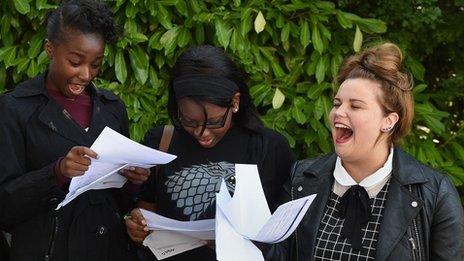Best and worst excuses for doing badly in GCSEs
- Published
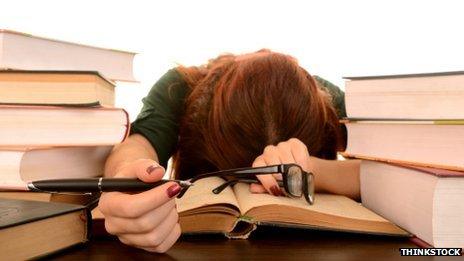
To sleep or not to sleep - that is the question.
Let's face it - no-one likes to mess up. So when it comes to disappointing GCSE results - it's useful to have someone or something else to blame.
Unwilling to admit they did not grasp the basics of say, glaciation, the self-deceiving candidate glides on the meltwater of injustice to seek a reason for their failure. It's only natural isn't it?
As students in England, Wales and Northern Ireland receive their results, here are some favourite excuses collected from the hanging valley of collective memory over the years. We've graded them out of 10 for credibility.
Blaming the teacher
Teachers are one species who are used to be being blamed, rightly or wrongly.
They are held accountable for their pupils' grades whether those pupils have actually done any work or not.
But sometimes they have an even greater hand in their students' fate than they would have liked.
A friend often recounts how a mix-up by her teacher over her German GCSE syllabus meant she was told to read the wrong books.
Imagine her horror when she opened her exam paper to find all the books she had studied in one single section of the paper - but instructions asking her to write essays in another part of the paper on a choice of books she had never heard of, let alone studied.
When her German teacher entered the exam room to see what all the fuss was about she visibly whitened like a heroine in a Gothic novel.
Bona fide excuse - 10/10
Blaming the exam paper
Every year the BBC News education team is inundated with claims of exam errors from frustrated teenagers.
Hard-done-by students email us with the minute detail about why a certain physics question, for example, is incorrect.
And us tiny-brained reporters are forced to grapple with Newton's laws of motion, for example, to see if their claims are correct.
If that fails, and it usually does in my case, we are forced to contact the Institute of Physics to discover if the candidate is right that it's wrong.

More often than not the mistake proves to be the candidate's, but very, very occasionally it is the testers who did not make the grade.
If that is the case it's got to be - 9/10
Blaming lack of sleep
A good night's sleep is scientifically proven to put you in tip-top condition, paying rich dividends to memory, concentration and energy levels.
That can be a little bit tricky if you've got Shakespeare's sonnets whirring around your head like helicopter blades slicing up your brain.
So if the candidate suffers from chronic insomnia - it is not a bad excuse for a bad mark - 8/10
On the other hand, if the bleary-eyed state has been caused by reckless consumption of energy drinks in order to catch up on work that fell off your revision timetable, then it's your own fault your eyes are so bloodshot you can't actually read the exam paper - 4/10.
Put simply, there's no better way to prepare for an exam than a solid eight hours in Snoozeville.
Blaming the exam conditions
Sometimes the candidate's degree of self-deception knows no bounds.
A twitching, unconfident student, shifting listlessly from one hip to the other might pick up on all sorts of distractions that stop them from doing their best.
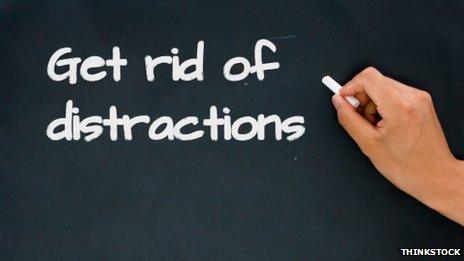
One teenager tweeted after an exam this summer: "Invigilators wearing squeaky crepes walking up and down - sorry but one cannot concentrate."
Another lay the fault in the lap of an over-active air conditioning unit, tweeting: "The exam hall was too cold for me to write. Was focused on survival. Sorry my instincts took over!"
One even blamed the bad body odour of a candidate sitting nearby. Desperate or what!
Unfortunately such an approach is certainly not going to convince in a grade appeal. The real culprit here is the inability to focus.
Get out of here - 2/10
Blaming the parents
Poor old mum and dad. They try their best for young Johnny, buying him books and dusting his desk daily only to be told. "Why did I fail? Because of you!"
It can be anything from failing to get the hapless teenager up at the right time to not having read them enough bedtime stories as a child.
One friend recalls how a classmate blamed his lack of GCSE success on the fact that his parents "did not create the right home learning environment".
And though this may sound like a spurious excuse all those years ahead on results day - there is some truth in it.
Academic research ties academic success to the actions of parents and their influence really does start early on.
Studies have shown that homes with fewer books and less stimulation produce children who are not so well-equipped to learn.
Another argues that it is only after children go to big school that the influence of parents is less than the influence of teachers.
But by the time teenagers are sitting their GCSEs it has to be their own responsibility to knuckle down and do some work - 5/10
Blaming poor memory
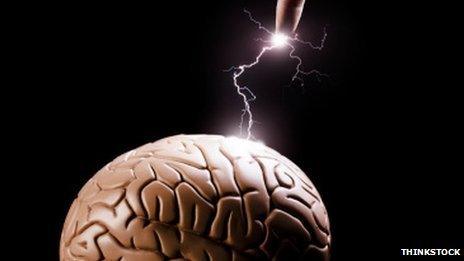
Light bulb moment - we all look for a flash of inspiration in an exam
I remember sitting my own GCSEs - well O-Levels as they were then. Cramming 11 syllabi worth of knowledge into my brain almost pushed it to the point of spontaneous human combustion.
"Would it not be great if I had a photographic memory?" I wondered, as I circled the key laws of physics with a highlighter pen for the umpteenth time. Anything to get those facts tattooed on my grey matter.
Of course there are no shortcuts to exam preparation but there is definitely some truth to the claim that some candidates are pre-destined to do better in exams than others because they are better at memorising facts.
Conversely there will be others who do better in coursework - the conventional wisdom is that these are girls who tend to work harder during the year.
And there may well be more students than usual blaming poor grades on poor memory this summer as for the first time since GCSEs were introduced, the qualification is being tested entirely on end of course examinations.
Er... what date were GCSEs introduced again? 8/10
- Published21 August 2014
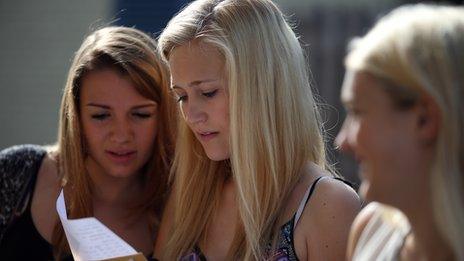
- Published21 August 2014
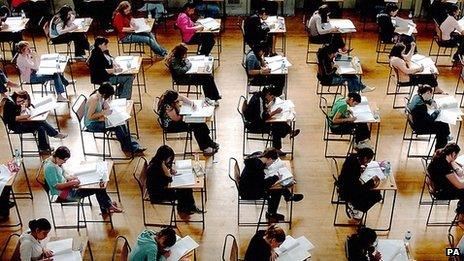
- Published21 August 2014
